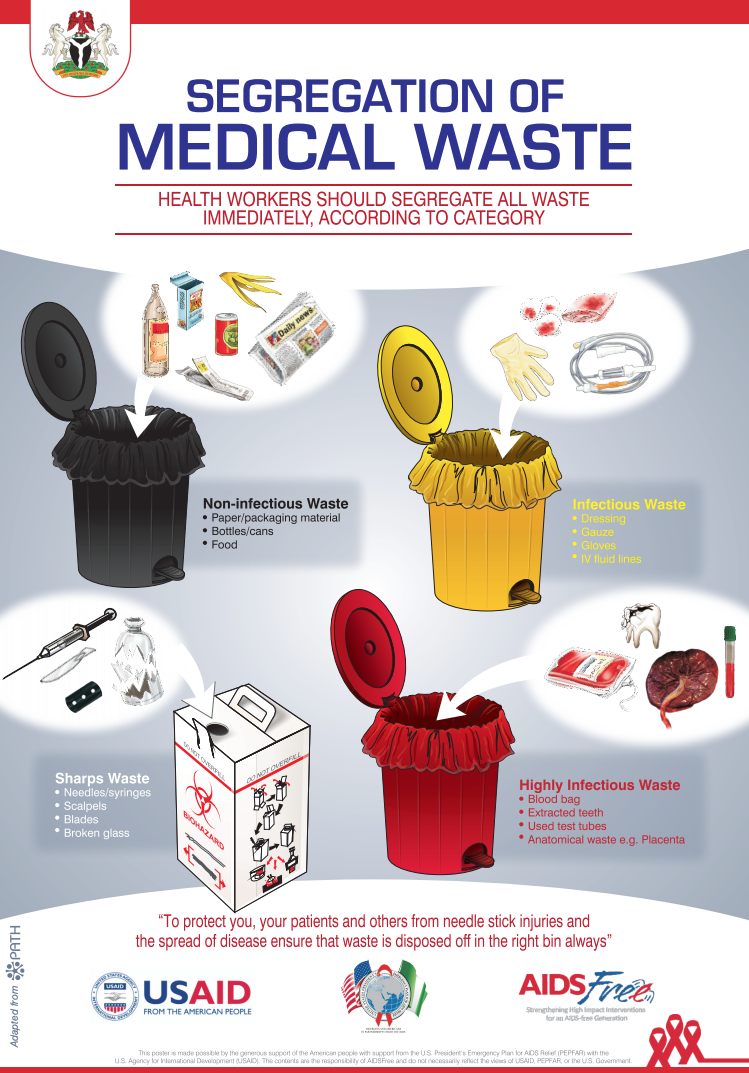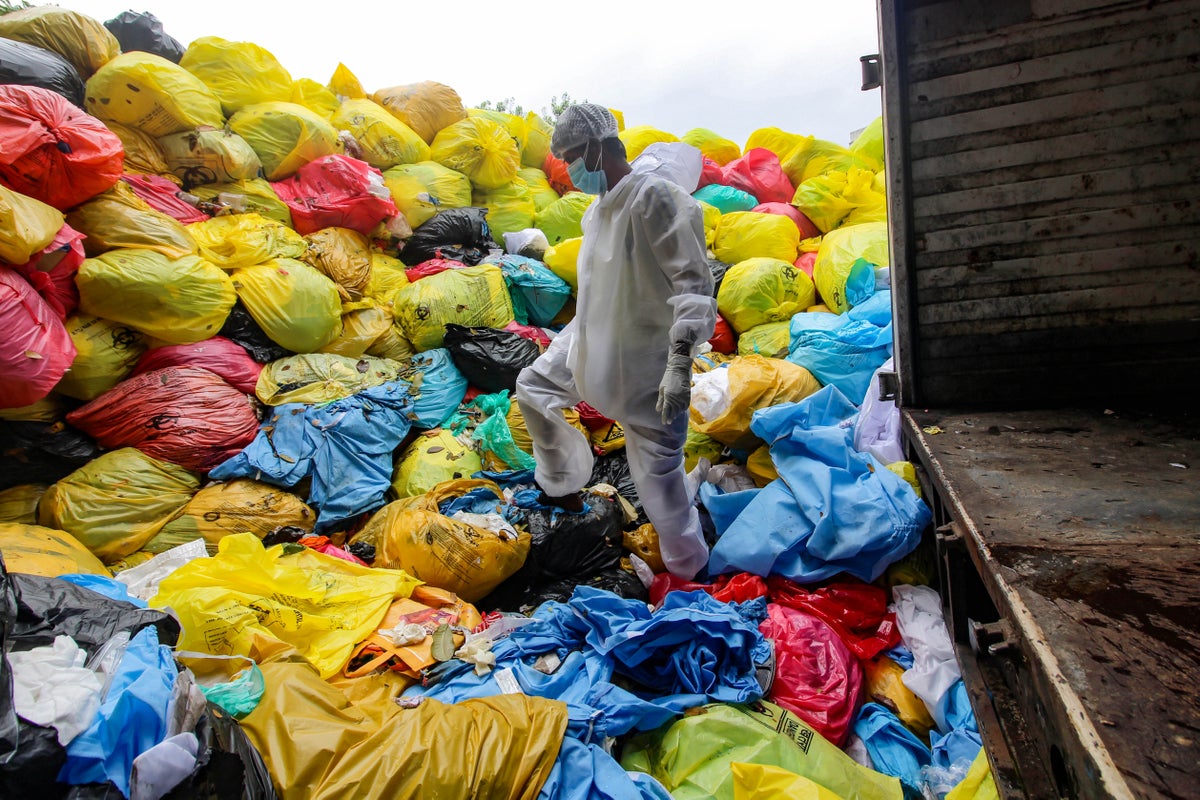Best Practices for Medical Waste Administration
Medical waste monitoring is an essential aspect of medical care facilities' operations to make sure the safety of clients, team, and the environment. Executing ideal practices in medical waste administration is important to reduce the threats linked with contaminated materials. This includes appropriate partition and classification of waste, guaranteeing its secure storage and labeling, sticking to governing standards, and making use of efficient disposal techniques. By following these finest practices, health care centers can minimize the potential for infections, injuries, and contamination brought on by improper handling and disposal of clinical waste. This intro intends to give a summary of the value of ideal practices for clinical waste monitoring and the succeeding areas will certainly explore each method thoroughly - medical waste disposal.

Partition and Categorization
In the field of medical waste administration, correct partition and classification are important methods for making certain the secure and efficient disposal of healthcare-related products. Medical waste is generated from numerous sources, consisting of health centers, centers, laboratories, and various other health care centers. It consists of a variety of products, such as needles, syringes, plasters, gloves, and pharmaceutical waste.
Partition includes the systematic separation of various sorts of clinical waste based on their characteristics and possible dangers. This procedure assists to avoid cross-contamination and makes sure that each type of waste is taken care of appropriately. Sharps waste, such as needles and blades, must be placed in puncture-resistant containers to stop injuries and the spread of transmittable illness. Infectious waste, such as blood-soaked plasters or cultures, should be segregated and treated individually to decrease the risk of spreading microorganisms.
Categorization is the process of categorizing clinical waste right into various groups based upon its possible hazards. These groups may consist of contagious waste, harmful waste, pharmaceutical waste, and basic waste. By classifying waste, medical care centers can determine the appropriate disposal methods and ensure compliance with local regulations and guidelines.
Proper partition and classification of clinical waste not just safeguard the health and wellness of healthcare workers and the basic public but additionally add to the total effectiveness and efficiency of waste administration. It decreases the risk of crashes, decreases ecological effects, and advertises accountable waste disposal methods.
Proper Storage Space and Classifying
To guarantee the safe and effective disposal of clinical waste, health care centers should abide by proper storage space and labeling practices. WasteX Medical Waste Disposal. Correct storage space and labeling play an important function in keeping the honesty of medical waste management systems and safeguarding the health and security of healthcare workers, individuals, and the public
When it concerns storage, it is vital to have actually marked areas particularly designed for different kinds of medical waste. These areas ought to be secure, well-ventilated, and furnished with appropriate containers that satisfy regulative requirements (medical waste disposal service). Partition and classification of waste ought to likewise be thought about to stay clear of cross-contamination and prospective dangers

Normal tracking and evaluation of storage space locations and containers are important to recognize any type of issues or infractions. Team ought to be trained on correct storage and labeling practices, stressing the importance of compliance with regulations and protocols.
Safe Transport and Handling
Making sure the correct and protected transportation and handling of clinical waste is vital for maintaining the honesty of waste management systems and protecting the health and wellness of all entailed. Medical waste, that includes products infected with transmittable materials, pharmaceuticals, and various other hazardous substances, must be delivered in a manner that stops leakages, spills, and possible contamination.
To achieve secure transport and handling, a number of ideal methods ought to be followed. It is vital to use leak-proof and puncture-resistant containers that are specifically developed for medical waste. These containers need to be properly sealed and classified to avoid any kind of unintended direct exposure or messing up. Additionally, waste ought to be segregated based on its nature and kind to stop cross-contamination.
Throughout transportation, it is vital to guarantee that waste containers are firmly attached and kept in a stable manner. Autos used for moving medical waste ought to be equipped with proper safety functions, such as spill containment systems, to reduce the danger of any spills or leaks. Chauffeurs must get training on appropriate handling and emergency reaction procedures to effectively attend to any kind of unforeseen events.
Additionally, the transportation and handling of clinical waste need to adhere to all pertinent regulations and standards established forth by local, state, and federal authorities. WasteX Medical Waste Disposal. medical waste removal service. Routine examinations and audits need to be conducted to evaluate compliance and identify any locations for improvement
Conformity With Regulatory Guidelines
Keeping compliance with governing guidelines is necessary for efficient medical waste administration. These standards are implemented to protect public health and wellness and the setting by making certain that clinical waste is properly dealt with, treated, and disposed of. Conformity with governing guidelines aids to avoid the spread of transmittable conditions, lessen prospective dangers, and decrease the overall impact of medical waste on the environment.
To attain compliance, healthcare centers should stay notified about the certain guidelines regulating medical waste administration in their jurisdiction. These laws may vary from country to nation, and also within different states or regions. It is very important for healthcare facilities to have an extensive understanding of these guidelines and to execute suitable techniques and protocols to make certain compliance.
One secret aspect of conformity is the appropriate segregation and labeling of various kinds of clinical waste. This consists of separating sharps from various other waste, in addition to classifying waste based on its potential risks. Healthcare centers have to also make certain that clinical waste is stored in ideal containers which these containers are effectively labeled and secured.
Additionally, compliance with governing guidelines needs medical care facilities to establish correct training and education and learning programs for team member associated with clinical waste monitoring. This consists of supplying training on waste partition, dealing with, and disposal treatments, as well as the correct usage of personal protective tools.
Regular tracking and audits are also necessary to guarantee recurring conformity with regulative standards. This entails carrying out regular inspections of waste storage space areas, documenting waste monitoring procedures, and preserving records of waste disposal.
Effective Disposal Approaches
Healthcare facilities should employ efficient disposal approaches for proper administration of medical waste. Inappropriate disposal of medical waste can present major health and ecological dangers. There are numerous approaches that can be utilized to effectively get rid of medical waste, guaranteeing the safety and security of health care workers, people, and the basic public.
One typically made use of approach is incineration. Burners can safely burn clinical waste at high temperature levels, decreasing the volume and damaging any type of potentially dangerous virus. However, incineration can be expensive and might launch harmful toxins right into the air if not correctly regulated.
Another method is autoclaving, which involves subjecting the waste to high-pressure steam. This procedure eliminates bacteria, viruses, and other bacteria, making the waste secure for disposal in regular waste streams. Autoclaving is a eco pleasant and effective method, however it needs specialized equipment and trained workers.
Chemical sanitation is also made use of in many cases, where fluid chemicals are put on the waste to disinfect it. This find out this here technique is much less commonly utilized because of problems about the effectiveness of chemical sanitation and the possibility for chemical deposits to contaminate the environment.
In addition to these techniques, medical care centers should also carry out correct partition, product packaging, and labeling of medical waste to ensure its risk-free handling and disposal. Routine training and education and learning of team on correct waste monitoring techniques are important to preserving efficient disposal techniques.
Verdict
In verdict, implementing best practices for medical waste management is essential for making sure the safety and security of healthcare employees, clients, and the atmosphere. By appropriately categorizing and segregating waste, storing and classifying it appropriately, making certain secure transport and handling, abiding by regulative guidelines, and employing reliable disposal approaches, health care facilities can efficiently manage and decrease the threats connected with medical waste. It is essential for healthcare companies to focus on and adhere to these best practices to keep a sustainable and secure health care environment.
Clinical waste administration is an important element of healthcare centers' operations to make certain the security of clients, team, and the atmosphere. Implementing ideal practices in clinical waste administration is essential to decrease the dangers linked with harmful waste. These categories might include contagious waste, dangerous waste, pharmaceutical waste, and general waste.In verdict, executing ideal practices for clinical waste management is crucial for guaranteeing the safety and security of healthcare employees, patients, and the atmosphere. By effectively segregating and categorizing waste, saving and identifying it appropriately, guaranteeing secure transportation and handling, conforming with governing guidelines, and utilizing efficient disposal methods, healthcare centers can properly manage and lessen the threats associated with medical waste.